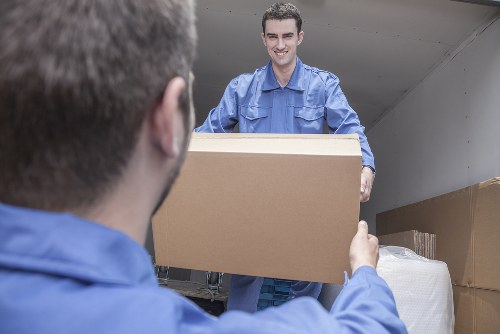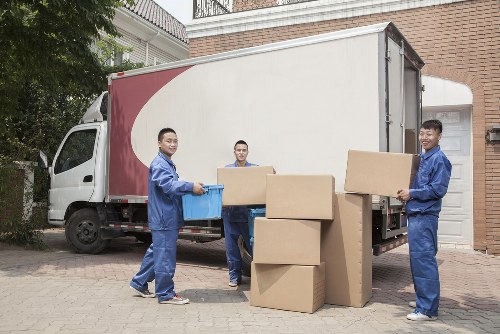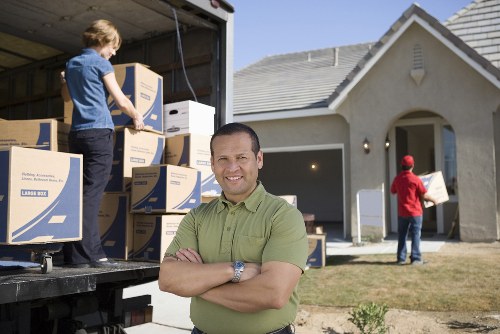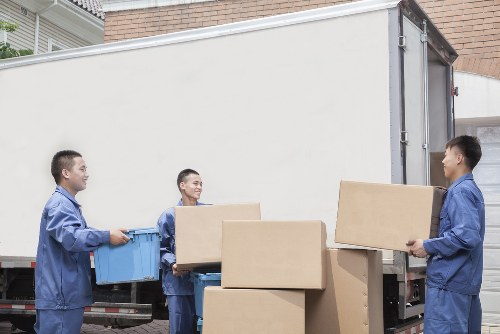Comprehensive Guide to Council Waste Collection in Reading

Managing household waste is an essential aspect of maintaining a clean and healthy environment. In Reading, the council waste collection services play a pivotal role in ensuring that residents dispose of their waste responsibly and efficiently.
Understanding the waste collection schedule, types of waste accepted, and proper disposal methods can help residents contribute to a sustainable community.
This guide provides detailed information on council waste collection in Reading, offering insights into collections, recycling programs, and tips for minimizing waste.
Waste Collection Schedule

The council in Reading operates a well-structured waste collection schedule to accommodate the needs of all residents. Typically, the service includes regular collection days for general waste, recycling, and garden waste.
It's crucial for residents to adhere to the designated days to ensure smooth operations and avoid missed collections.
Residents can find their specific collection days by entering their postcode on the Reading Borough Council's official website.
General Waste Collection
General waste includes items that cannot be recycled or composted. This category covers non-recyclable plastics, food-soiled paper, diapers, and other similar materials.
Residents are advised to place their general waste in the provided bins on the scheduled collection day, ensuring that it is securely closed to prevent spillage or attracting pests.
Enclosed items, such as plastic bags and wrapped goods, should be avoided as they can cause blockages in waste collection vehicles.
Recycling Services
Recycling is a key component of Reading's waste management strategy. The council provides separate collection bins for recyclables, including paper, cardboard, glass bottles, and certain plastics.
Proper sorting is essential to maximize recycling effectiveness. Residents should rinse containers to remove food residues and ensure that recyclable materials are free from contamination.
Additionally, Reading offers facilities for bulk recycling, allowing residents to dispose of large items like furniture and electronics responsibly.

Garden Waste Collection
Garden waste, such as leaves, branches, and grass clippings, can be composted or recycled into mulch. The council provides specific collection services for garden waste to promote environmental sustainability.
Residents can schedule garden waste collections by contacting the council or using the online portal. It's important to bundle the waste appropriately and follow any size restrictions to ensure successful collection.
Alternative options include utilizing green bins or participating in local composting programs offered by the council.
Hazardous Waste Disposal
Hazardous waste, including chemicals, batteries, and electronics, requires special handling to prevent environmental contamination.
Reading council organizes periodic hazardous waste collection events where residents can safely dispose of such materials. It's imperative to follow the guidelines provided to ensure safe disposal.
Permanent drop-off points are also available for ongoing hazardous waste management, offering residents convenient options for responsible disposal.
Electronic Waste (E-Waste)
Electronic waste includes outdated or broken electronic devices like phones, computers, and appliances. Proper disposal of e-waste is crucial to recover valuable materials and prevent environmental harm.
Residents can take advantage of e-waste collection services provided by the council or visit designated recycling centers to drop off their electronic items.
Some retailers also offer take-back programs, allowing residents to return old electronics when purchasing new products.

Recycling Programs and Initiatives
Reading council actively promotes recycling through various programs and initiatives aimed at reducing waste and encouraging sustainable practices.
Initiatives include educational campaigns, providing recycling bins to households, and organizing community events to raise awareness about the importance of recycling.
Residents are encouraged to participate in these programs to contribute to a greener and more sustainable Reading.
Tips for Effective Waste Management
- Reduce: Minimize waste by choosing reusable products and avoiding single-use items.
- Reuse: Find new uses for old items instead of discarding them.
- Recycle: Properly sort recyclables to ensure they are processed correctly.
- Compost: Compost organic waste to enrich soil and reduce landfill waste.
- Educate: Stay informed about waste management practices and encourage others to do the same.
Local Recycling Centers in Reading
In addition to regular collections, Reading council provides access to several local recycling centers where residents can drop off various types of waste.
- Reading Recycling Centre: Located on Park Street, offering services for general recyclables and bulky items.
- Bramhall Arboretum: Provides facilities for garden waste and composting.
- Green Bridge: A facility dedicated to electronic waste recycling.
- Minster Town: Hosts periodic hazardous waste collection events.

Nearest Areas to Reading for Waste Collection
Reading council's waste collection services extend to several nearby areas, each with its unique features and proximity to Reading.
- Southcote: Located just south of Reading, Southcote benefits from regular waste and recycling collections.
- Tilehurst: To the west, Tilehurst residents enjoy efficient waste collection and access to local recycling centers.
- Emmer Green: East of Reading, Emmer Green offers comprehensive waste management services.
- Carlton: North of Reading, Carlton participates actively in council recycling programs.
- Newtown: Close to the center, Newtown has robust waste collection schedules.
- Peppard: West, Peppard residents benefit from convenient waste disposal options.
- Hurst: Northwest, Hurst is well-served by regular waste and garden waste collections.
- Whitley: Northeast, Whitley has easy access to recycling facilities.
- Sonning: A bit further out, Sonning still enjoys periodic waste collection services.
- Crowthorne: Southwest, Crowthorne participates in community recycling initiatives.
- Earley: Southeast, Earley residents have access to comprehensive waste management.
- Sonning Common: Nearby, Sonning Common benefits from shared recycling resources.
- East Reading: Specifically catered to, East Reading has specialized waste collection programs.
- Kennington: North-northeast, Kennington enjoys the same efficient services as Reading.
- Tilehurst Lock: An extension of Tilehurst, Lock area has dedicated waste collection schedules.
Understanding Council Waste Regulations
Compliance with council waste regulations is essential for maintaining public health and environmental standards.
Residents must follow guidelines on waste separation, bin usage, and collection schedules to ensure effective waste management.
Failure to adhere to these regulations can result in penalties and negatively impact the community's sustainability efforts.
Proper Waste Sorting
Sorting waste correctly is crucial for recycling efficiency. Residents should familiarize themselves with the types of materials accepted in each recycling bin.
Commonly recycled items include paper, cardboard, certain plastics, glass bottles, and metal cans. Non-recyclable items should be disposed of in the general waste bin.
Contaminated recyclables, such as greasy pizza boxes or soiled containers, can hinder the recycling process and lead to more waste being sent to landfills.
Bin Maintenance and Placement
Proper maintenance of waste bins ensures that they function effectively and remain pest-free. Residents should regularly clean their bins and use secure lids to prevent animals from accessing the waste.
Bins should be placed at the curbside on collection days, adhering to any specific placement instructions provided by the council.
Overfilled bins can cause collection delays and attract unwanted pests, so it's important to manage waste levels appropriately.
Benefits of Effective Waste Collection
Efficient waste collection services bring numerous benefits to the community, including:
- Environmental Protection: Reduces landfill usage and promotes recycling, minimizing environmental impact.
- Public Health: Prevents the spread of diseases by ensuring proper disposal of waste.
- Aesthetic Appeal: Maintains clean streets and public areas, enhancing the overall appearance of the community.
- Resource Conservation: Encourages the reuse and recycling of materials, conserving natural resources.
- Community Well-being: Promotes a sense of responsibility and community spirit towards sustainable living.
Future Developments in Waste Management
Reading council is continually seeking innovative solutions to improve waste management services. Future developments may include:
- Implementing advanced recycling technologies to increase efficiency.
- Expanding composting programs to handle more organic waste.
- Introducing smart waste collection systems for better route optimization.
- Launching educational campaigns to further engage residents in sustainable practices.
- Promoting zero-waste initiatives to reduce overall waste generation.
Conclusion
Effective council waste collection in Reading is vital for maintaining a clean, healthy, and sustainable environment. By understanding the waste collection schedule, adhering to proper disposal methods, and participating in recycling programs, residents can significantly contribute to the community's well-being.
Staying informed about local regulations and utilizing available resources ensures that waste management practices are carried out efficiently, benefiting both current and future generations.
Embracing responsible waste management not only preserves the beauty of Reading but also fosters a culture of sustainability and environmental stewardship.
Frequently Asked Questions
1. How do I find my waste collection day in Reading?
You can find your specific waste collection day by entering your postcode on the Reading Borough Council's official website or by contacting their customer service.
2. What items are accepted in the recycling bin?
The recycling bin accepts paper, cardboard, certain plastics, glass bottles, and metal cans. Ensure that items are clean and free from food residues to avoid contamination.
3. How can I schedule a garden waste collection?
Garden waste collections can be scheduled by contacting the council through their online portal or by phone. Make sure to bundle the waste appropriately and follow any size restrictions.
4. Where can I dispose of hazardous waste in Reading?
Hazardous waste can be disposed of during periodic collection events organized by the council or by visiting designated recycling centers. Check the council's website for event dates and locations.
5. What should I do with old electronics?
Old electronics can be taken to e-waste recycling centers, returned to retailers through take-back programs, or brought to special collection events organized by the council.